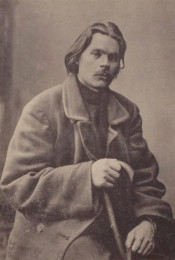
Birth of Russian, Soviet writer Maxim Gorky
On March 16 (28), 1868, in Nizhny Novgorod, Alexey Maksimovich Peshkov, who became famous as the writer Maxim Gorky, was born in the family of cabinetmaker Maxim Savvatyevich Peshkov (1840–1871) and Varvara Vasilievna Kashirina (1842–1879).
At the age of eleven, Peshkov became an orphan and spent his childhood in the family of his maternal grandfather Vasily Kashirin. He started working early: as a messenger at a shoe store, as a cook on ships, as a baker, and as a draftsman. He did not receive a secondary education, but read a lot and engaged in self-development.
In 1884 he came to Kazan and made an unsuccessful attempt to enter the university. He learned about the revolutionary movement and was engaged in the work of underground populist circles. In December 1887, he attempted suicide by shooting his lung with a gun. The wound caused a long-term illness of the respiratory organs.
In 1888–1889 and 1891–1892 he wandered around the south of Russia. He visited Volga Region, the Don, Ukraine, Crimea and the Caucasus, where he changed many jobs. The impressions of this time became a source of subjects and images for creativity. In 1892, the newspaper “Caucasus” published the story “Makar Chudra”, signed “M. Gorky". The aspiring writer returned to Nizhny Novgorod, where, with the support of the writer V. G. Korolenko, he published several stories in the newspapers “Volgar” and “Volzhsky Vestnik”. Then he began working at Samara Gazeta under the pseudonym Yehudiel Khlamida.
M. Gorky gained all-Russian and all-European fame with the publication of the collection “Essays and Stories” (1898), in which “Old Woman Izergil”, “Chelkash”, “Song of the Falcon” and others were published. The novel “Foma Gordeev” (1899) brought forward young author among the world-class writers. In 1902, the first plays by M. Gorky were staged at the Moscow Art Theater: “The Bourgeois” (1901) and “At the Lower Depths” (1902). Together with the plays “Summer Residents” (1904), “Children of the Sun” (1905), “Barbarians” (1906), M. Gorky became the founder of the “social realism” movement in Russia. In 1900, he began working at the publishing house “Znanie”, around which he rallied the greatest writers of that time, close to the realistic movement (I. A. Bunin, L. N. Andreev, A. I. Kuprin, etc.).
He took an active part in the revolutionary events of 1905 and joined the Russian Social Democratic Labor Party. In 1906 he emigrated to America, and then moved to Italy, to Capri, where he lived until 1913. During this period, the novel “Mother” (1906), the plays “The Last” (1908), and “Vassa Zheleznova” (1910), the story “Summer” (1909), “The Town of Okurov” (1910), “The Master” (1913), “Childhood” (1913–1914) were written.
In 1913 he returned to St. Petersburg, where he began to collaborate in the Bolshevik newspapers Zvezda and Pravda. After the February Revolution, he published articles under the general title “Untimely Thoughts” in the newspaper “New Life” which was the organ of the Social Democrats. He expressed concerns about the unpreparedness of the October Revolution. After October 1917, he became involved in cultural and social work: he participated in the organization of the 1st Workers' and Peasants' University, and founded the publishing house "World Literature".
M. Gorky’s intercession for the arrested representatives of the creative intelligentsia and increasing disagreements with the policies of Lenin and the Bolsheviks led the writer to a new emigration, which continued intermittently until 1933. Formally, it was presented as a trip abroad for treatment. During this period, the trilogy “My Universities” (1923) was completed, the novel “The Artamonov Case” (1925) was written, his work began on the epic novel “The Life of Klim Samgin” (parts 1–3 (1927–1931); unfinished part 4 ( 1937)).
In May 1933 he finally returned to the USSR. He initiated the creation of the Union of Soviet Writers (August 1934) and the holding of the First All-Union Congress of Soviet Writers, at which it was announced that M. Gorky “developed the basic principles of the art of socialist realism”. The work of these years characterizes the writer as one of the ideologists of the Soviet system, indirectly and directly advocating apologetics for the Stalinist regime. In the 1930s wrote a whole series of plays about wrecking engineers, about the death of the bourgeoisie and the triumph of the socialist revolution, which were staged by theaters across the country: “Somov and others” (1931), “Egor Bulychev and others” (1932), “Dostigaev and others” (1933). He co-edited the book “The White Sea-Baltic Canal named after Stalin” (1934).
He died on June 18, 1936 in Gorki. On June 20, the urn containing the ashes was placed in the Kremlin wall on Red Square in Moscow. After the death of M. Gorky, it was announced that he was killed by “enemies of the people from the right-wing Trotskyist organization, agents of the imperialists, against whom he courageously fought”. The People's Commissar of Internal Affairs of the USSR (1934–1936) G. G. Yagoda, the writer's secretary P. P. Kryuchkov and several doctors of the Kremlin medical and sanitary department were directly accused of murder. This accusation was one of the most important in the trial of the “anti-Soviet right-wing Trotskyist bloc”.
From 1932 to 1990 his hometown, Nizhny Novgorod, bore the name of Gorky. Theaters, libraries, factories, and streets were named in his honor, many of which still bear the name of the writer.
Lit.: Большая советская энциклопедия: в 50 т. Т. 12. М., 1952; Залесский К.А. Империя Сталина. Биографический энциклопедический словарь. М., 2000; Козьменко М.В. Горький Максим // Большая российская энциклопедия; Русские писатели и поэты. Краткий биографический словарь. М., 2000.
Based on the Presidential Library's materials:

